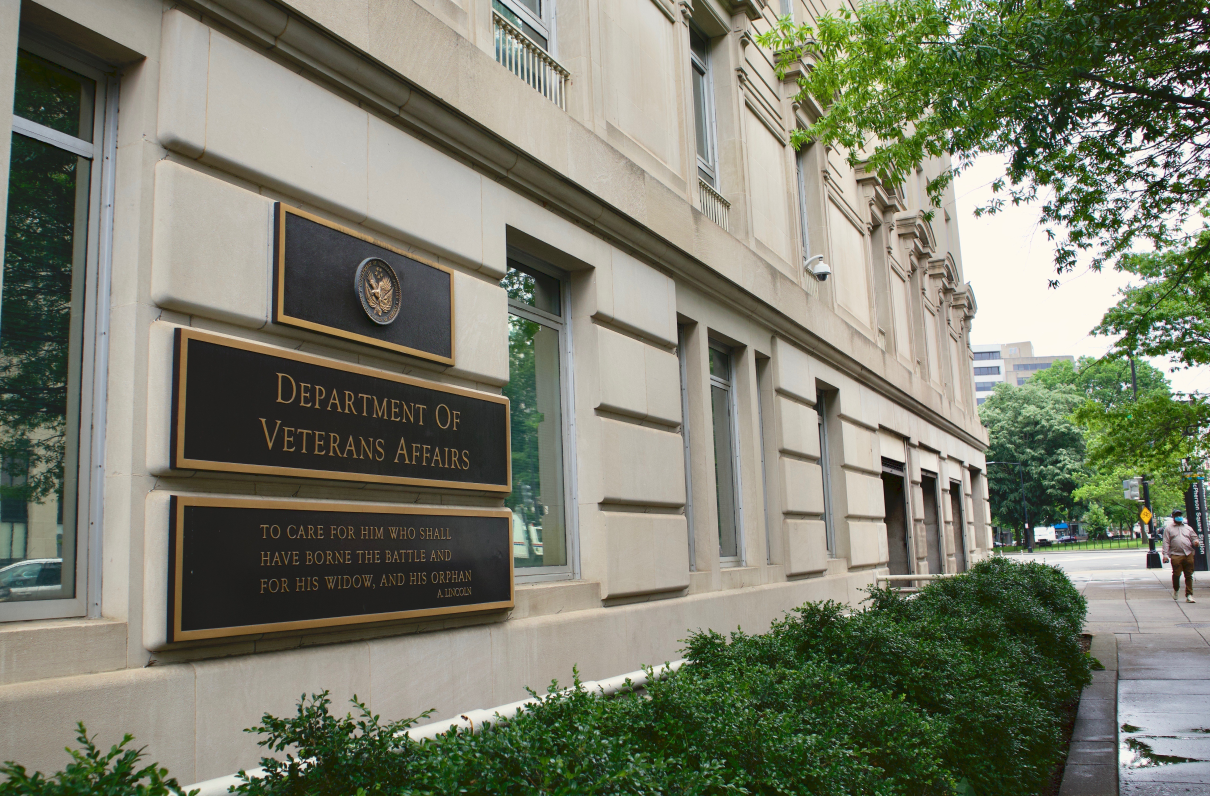A proposal in a December 2022 Congressional Budget Office (CBO) report suggesting the reduction or elimination of VA disability payments for veterans with higher incomes received significant attention on social media in recent weeks – enough that it was raised, and rebuked, during VA Secretary Denis McDonough’s press conference March 23.
As MOAA outlined shortly after the report was released, the CBO options include potential cuts to military spending, veterans’ benefits, and TRICARE. The report, filed at the start of each new Congress for the past 12 years, provides lawmakers with options to reduce the deficit through spending cuts and ways to increase revenue. The nonpartisan CBO has no say in political objectives and is simply fulfilling its mandated mission via these reports.
While the notion of means-testing VA disability pay is concerning, no legislation to that effect has been offered in either chamber, nor has the proposal been a part of any administration budget plans.
“The time for action from MOAA on these proposals is when these items reach even the earliest stage of meaningful debate in the halls of Congress," said MOAA President and CEO Lt. Gen. Brian T. Kelly, USAF (Ret). "These changes cannot happen without action by Congress, and MOAA will be quick to tell legislators and staffers why implementing these ideas not only would deprive veterans of earned benefits, but break faith with servicemembers past and present.”
[RELATED: MOAA Testimony to Joint Congressional Panel Outlines Key Priorities for Veterans]
MOAA believes our servicemembers and veterans have earned these benefits through their service and sacrifice, and any changes to these programs must be made with the utmost care and consideration.
MOAA has identified 13 options from the CBO report which could harm the wider uniformed services community; we will continue to fight for our constituents to ensure proposals like these are not enacted, or even considered.
These ideas would cut the deficit, but they'd do so with devastating, and predictable, consequences: Reducing earned benefits amid a recruiting crisis, and shattering confidence in the DoD and VA as institutions among servicemembers, veterans, retirees, and prospective members of the future force.
MOAA previously outlined specific concerns with TRICARE For Life (TFL) and cost-of-living adjustment (COLA) issues because there was specific congressional movement on related benefit cuts over the years. While MOAA regularly engages on this larger set of topics and would oppose CBO options pertaining to our uniformed services and veterans, we focus on items being discussed by committee leadership, backed by the administration, or included in draft legislation. Other materials may receive publicity online or within veteran networks, but MOAA stays focused on programs actually at risk or improvements on the cusp of becoming law.
Here are the CBO options of interest to the wider uniformed services community, divided by funding rules:
Mandatory Spending
- Introduce Enrollment Fees for TRICARE For Life
- Introduce Minimum Out-of-Pocket Requirements in TRICARE For Life
- Means-Test VA Disability Compensation for Veterans with Higher Income
- End VA’s Individual Unemployability Payments to Disabled Veterans at the Full Retirement Age for Social Security
- Reduce VA’s Disability Benefits for Veterans Who Are Older Than the Full Retirement Age for Social Security
- Narrow Eligibility for VA’s Disability Compensation by Excluding Veterans with Low Disability Ratings
- Use an Alternative Measure of Inflation to Index Social Security and Other Mandatory Programs
Discretionary Spending
- Cap Increases in Basic Pay for Military Service Members
- Replace Some Military Personnel with Civilian Employees
- Reduce the Basic Allowance for Military Housing to 80 Percent of Average Housing Costs
- Increase Prescription Drug Copayments for All Veterans
- End Enrollment in VA Medical Care for Veterans in Priority Groups 7 and 8
Revenues
- Include VA’s Disability Payments in Taxable Income
MOAA’s vigilance and dedication on these issues, and any others that may seek to decrease or eliminate service-earned entitlements, are codified in our motto, "Never Stop Serving." MOAA’s mission is clear: To preserve and protect earned benefits for our uniformed services, veterans, their families, and surviving spouses through advocacy, leadership, education, and service.
To keep up with the latest on these issues, watch The MOAA Newsletter and MOAA’s Advocacy News page for ongoing updates. You can learn how to make a difference on all of MOAA’s advocacy issues by visiting our Legislative Action Center.
Your paid membership has a direct impact on our ability to lobby on behalf of those who served, are serving now, and those who will serve in the future.
Click here to join or upgrade now. We appreciate your support.
You Ask, MOAA Answers: VA and the CBO
Here are MOAA’s expert-vetted answers to member questions about this issue and the wider CBO process.
Q. What is the CBO, and why did it propose cutting veterans’ benefits?
A. The Congressional Budget Office (CBO) is a nonpartisan agency that provides economic analysis and cost estimates for proposed legislation in Congress. Recently, the CBO released a report outlining options to reduce the federal deficit. These options include potential cuts to military spending, veteran benefits, and TRICARE. CBO compiles this report every two years, and many of its options would be very harmful to our community. However, Congress, not the CBO, must act to make any changes to our care and benefits.
Q. What are the potential impacts of the CBO options on military spending and benefits?
A. The CBO options include potential cuts to military spending, veteran benefits, and TRICARE. These cuts could negatively impact the readiness and well-being of our military community, including reducing the quality of health care and limiting resources for training and equipment. Additionally, any cuts to veterans’ benefits would break faith with our servicemembers past and present who have earned these benefits through their service and sacrifice.
[RELATED: MOAA's Legislative Priorities for the 118th Congress]
Q. Why isn't protecting VA benefits from income means-testing one of MOAA's top legislative priorities?
A. Ensuring those who serve and have served receive the benefits they've earned is a long-standing MOAA priority. MOAA regularly engages lawmakers and their staffs on this wider topic, but when it comes to specific interactions, we focus on items being discussed by committee leadership, backed by the administration, or included in draft legislation. Other materials may receive publicity online or within veteran networks, but MOAA cannot engage on all such topics without risking a loss of focus on programs at true risk, or much-needed program improvements on the cusp of becoming law.
Q. What is MOAA doing to oppose these CBO options?
A. MOAA is closely monitoring the situation and will take swift action to oppose any of the CBO options that would negatively impact our uniformed services community. We will work with Congress and other stakeholders to advocate for the best interests of our servicemembers and veterans and ensure that any changes to military spending, veteran benefits, and TRICARE are made with the utmost care and consideration.
[RELATED: Mark an Iraq War Milestone by Supporting Combat-Injured Veterans]
Q. Why didn't MOAA address this in December?
A. MOAA covered the CBO report's release in December, but it is common for individual options from the report to resurface months or years later. Nobody has made even a notional suggestion that these changes are on the table. While we are monitoring the situation, we've seen no push, even from the most budget-conscious lawmakers, to make such a deep cut to earned benefits.
Q. How does MOAA choose CBO items to address?
A. Some CBO items come as related spending debates are moving through Congress, making them more pressing threats. For example:
- Multiple reports and legislation beyond the CBO have outlined plans that would reduce the cost-of-living adjustment (COLA) for military retirees.
- Threats to TRICARE For Life and the wider TRICARE benefit have gone well beyond CBO inclusion.
- Congress already has lowered the Basic Housing Allowance from 100% of all housing costs to 95%, making the CBO’s proposal of a reduction to 80% more disconcerting.
These CBO items are closer to seeing the light of day, and thus are of more immediate concern to MOAA as we advocate on behalf of the wider uniformed services community.
Q. What can MOAA members do to help protect military spending and benefits?
A. Members can stay informed about the issue and contact their elected officials to express their concerns. MOAA also encourages members to join our advocacy efforts and help us advocate for the best interests of our military community. Together, we can make a difference and ensure that our servicemembers and veterans receive the care and benefits they were promised. Make sure you are signed up as an advocate in our Legislative Action Center. Finally, we need MOAA members to consider themselves as recruiters –- the more members we have in MOAA, the louder our voice.

